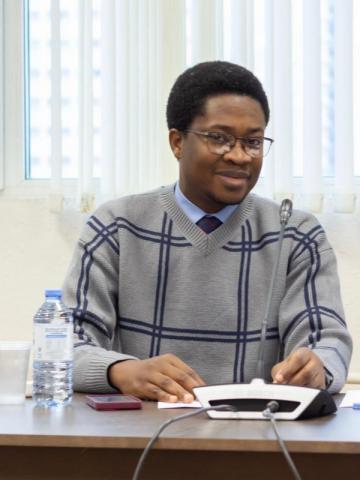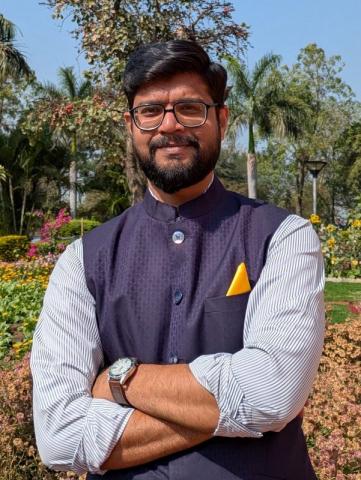The Journalism Research and Education (JRE) Section will be holding online elections for one chair and two vice-chair positions, for the term 2025 - 2029.
The elections will be held online from 7 to 21 May using the SurveyMonkey platform.
Individual members and representatives of institutional members in good standing, who are also registered as members of the Journalism Research and Education Section by 5 May are eligible vote. Voters will receive a voting link on 7 May.
To verify if you are a member of the COA Working Group, log in to your IAMCR account and select “My Sections and Working Groups” from the menu.
View the candidates and read their statements below.
Read about the Journalism Research and Education Section
More information and timeline at https://iamcr.org/s-wg/elections2025
Candidates
For Chair:
For Vice-chair:
- Mustapha Muhammed Jamiu, RUDN University & MISIS University, Russian Federation
- Nimmagadda Ramakrishna Bhargav, Indian Institute of Management Indore, India
Statements
For Chair
Ruhan ZHAO, Communication University of China
I am very honored to present here with a profound sense of responsibility and a burning passion for the future of the Journalism Research and Education section. My name is Ruhan ZHAO, a Professor at the Communication University of China and Vice Chair of JRE (2021-2025). I am humbled to announce my candidacy for the chair of this prestigious and vibrant international academic community.
Over the past four years, I have deeply and actively engaged in the operation of JRE affairs and served our section members around the world. I have worked extensively in the IAMCR annual conferences and organized multiple academic exchange activities such as book launches, webinars, and regional conferences. As a professional scholar with a global vision, my dedication to digital journalism and journalistic culture research has generated various publications, such as more than 40 research papers and 5 books (including edited books and translations, such as What Journalism Could Be by Barbie Zelizer and Crisscrossing Communication Research by Chin-chuan LEE). These efforts have bridged global perspectives and fortified our international academic network.
Rooted in my working experience and unwavering commitment to JRE, my vision for the future of JRE section is one of inclusiveness, excellence, and global impact, and I wish to share my commitments with you today.
Advancing Academic Excellence
I am committed to fostering an inclusive and cooperative environment where academic excellence thrives. This commitment includes supporting our members with the resources they need to conduct groundbreaking research, publish original research in quality journals, and participate in diverse academic activities. I will also advocate for increased cooperation with leading journals and building partnerships with prominent institutions.
Promoting Global Collaboration and Diversity
I will work tirelessly to strengthen our ties with academic communities worldwide by fostering exchange programs, joint research initiatives, and collaborative projects that transcend national and cultural barriers. I will devote myself to creating an open and inclusive atmosphere where every voice is heard and valued. Together, we will build a more equitable and vibrant academic community.
Supporting Early-Career Scholars
The future of our section lies in the new generation of scholars. I am devoted to introducing mentorship programs, career development workshops, and tailored networking opportunities to connect early-career researchers with established professionals in their respective subfields. As editor of several international academic journals, I will create more opportunities for young academics with high-quality research to get their excellent works published.
In summary, as JRE confronts new challenges in an ever-changing digital era, we should embrace innovative approaches, enhance global partnerships, and emphasize diverse perspectives to prompt meaningful progress in our field. For the sustainable development of JRE, I will focus on the listening of suggestions from all members and the building of a closer and interactive professional network. With your support, we can build a vibrant and promising future for JRE and IAMCR. Thank you for your trust. Your vote is extremely important for me and for the future of JRE family.
For Vice-chair

Mustapha Muhammed Jamiu, RUDN University & MISIS University, Russian Federation
Dear Members of the IAMCR Journalism Research and Education Section,
I am honored to present my candidacy for the Vice-Chair position of the Journalism Research and Education Section of IAMCR. As an Associate Professor at RUDN University and MISIS University, and the Director of the Center for Research on Development of African Media, Governance and Society (CEREDEMS-Africa), I bring a wealth of experience in journalism research, media education, and international collaboration.
With over a decade of academic and professional engagement in media and communication studies, I have dedicated my career to fostering research and education that advance ethical journalism, media literacy, and the role of communication in governance and societal development. My work has particularly focused on the intersection of media, politics, and technology, with a focus on the African continent’s evolving media landscape.
As Vice-Chair, I am committed to strengthening the section’s role as a platform for cutting-edge research, critical discussions, and innovative pedagogical approaches in journalism education.
My vision includes:
- Expanding Global Engagement: Enhancing the participation of researchers from diverse backgrounds, especially from underrepresented regions, to promote inclusivity in media research and education.
- Strengthen the Link Between Academia and Industry – Bridge the gap between theoretical journalism research and industry practices by facilitating dialogues between educators, researchers, and media practitioners to ensure journalism education remains relevant and responsive to industry needs.
- Fostering Emerging Research Areas: Supporting studies on the impact of digital transformation, artificial intelligence, and media ethics in contemporary journalism.
- Capacity Building and Mentorship: Creating mentorship programs for early-career researchers and educators to build a strong and dynamic scholarly community.
IAMCR has been a vital force in shaping global media and communication scholarship, and I am eager to contribute my quota to its continued success by serving as Vice-Chair of the Journalism Research and Education Section. I look forward to working closely with colleagues to promote academic excellence, research innovation, and meaningful dialogue within the field.
Thank you for your consideration.
Sincerely,
Dr. Mustapha Muhammed Jamiu
Associate Professor, RUDN University & MISIS University, Russian Federation
Director, CEREDEMS-Africa
istjabah@gmail.com

Nimmagadda Ramakrishna Bhargav, Indian Institute of Management Indore, India
We are living through a moment shaped by the contradictions of a post-truth world—where digital abundance coexists with eroding public trust, rising media consumption meets shrinking attention spans, physical labour is invisibilised and platformised, and algorithmic distribution fuels both information and misinformation. These conditions are further intensified by rapid technological disruptions, mounting curbs on free speech, growing precarity at work, and an escalating backlash against diversity, equity, and inclusion (DEI) in professional spaces.
Journalism, as both a field and a profession, is not immune to these pressures. These challenges not only target journalism’s democratic and professional ideals but also expose its structural faultlines—economic, epistemic, and political.
In this context, the Journalism Research and Education (JRE) Section of IAMCR has a vital role to play—as a space for critical dialogue, inclusive scholarship, and global engagement. As a scholar based in and working from the underrepresented geographies of journalism and media studies and with prior experience as a journalist, I bring an insider’s perspective on how global crises manifest in the Global South—not as distant trends, but as lived realities. My research does not merely theorise precarity and marginality; it emerges from those very conditions.
I am an Assistant Professor in the Communications Area at the Indian Institute of Management Indore. My research lies at the intersection of media sociology and journalism studies, with a regional focus on India and the Global South. My monograph, Stringers and the Journalistic Field (Routledge, 2023), based on a decade-long ethnography, explores how precarious Indian-language stringers in small towns navigate professional identity and survive within the journalistic field. This work advances theoretical conversations on labour, legitimacy, autonomy, and the gendered nature of journalism.
My work has been featured in Journalism Studies, Economic and Political Weekly, and many other scholarly and public platforms on themes such as journalistic autonomy, digital inequalities, and the structural conditions shaping media work. I worked as a postdoctoral Research Assistant on the UKRI-funded project Framing the Nation: Citizenship, Conflict, and the Media in Contemporary India, led by Loughborough University.
The JRE Section has been instrumental in shaping my scholarly journey. My vision for the Section is rooted in a deep commitment to equity and the spirit of global dialogue that IAMCR exemplifies. As a member since 2012, I have gained immensely from its inclusive and vibrant community—from receiving a travel grant in 2013 to participating in several editions of the conference.
If elected as Vice-Chair of the JRE Section, I will work closely with fellow Section leads to:
- Deepen mentorship networks, particularly for early-career scholars from underrepresented regions.
- Organise specialised workshops for PhD candidates and ECRs, alongside new book discussions and practitioner-oriented sessions.
- Strengthen South–South and South–North collaborations that foreground diverse epistemologies.
As researchers and educators, we share the responsibility to critique and reimagine journalism’s place in democracy. I invite you to join me in building a more inclusive and globally engaged JRE Section—your vote and support can help turn this vision into reality.